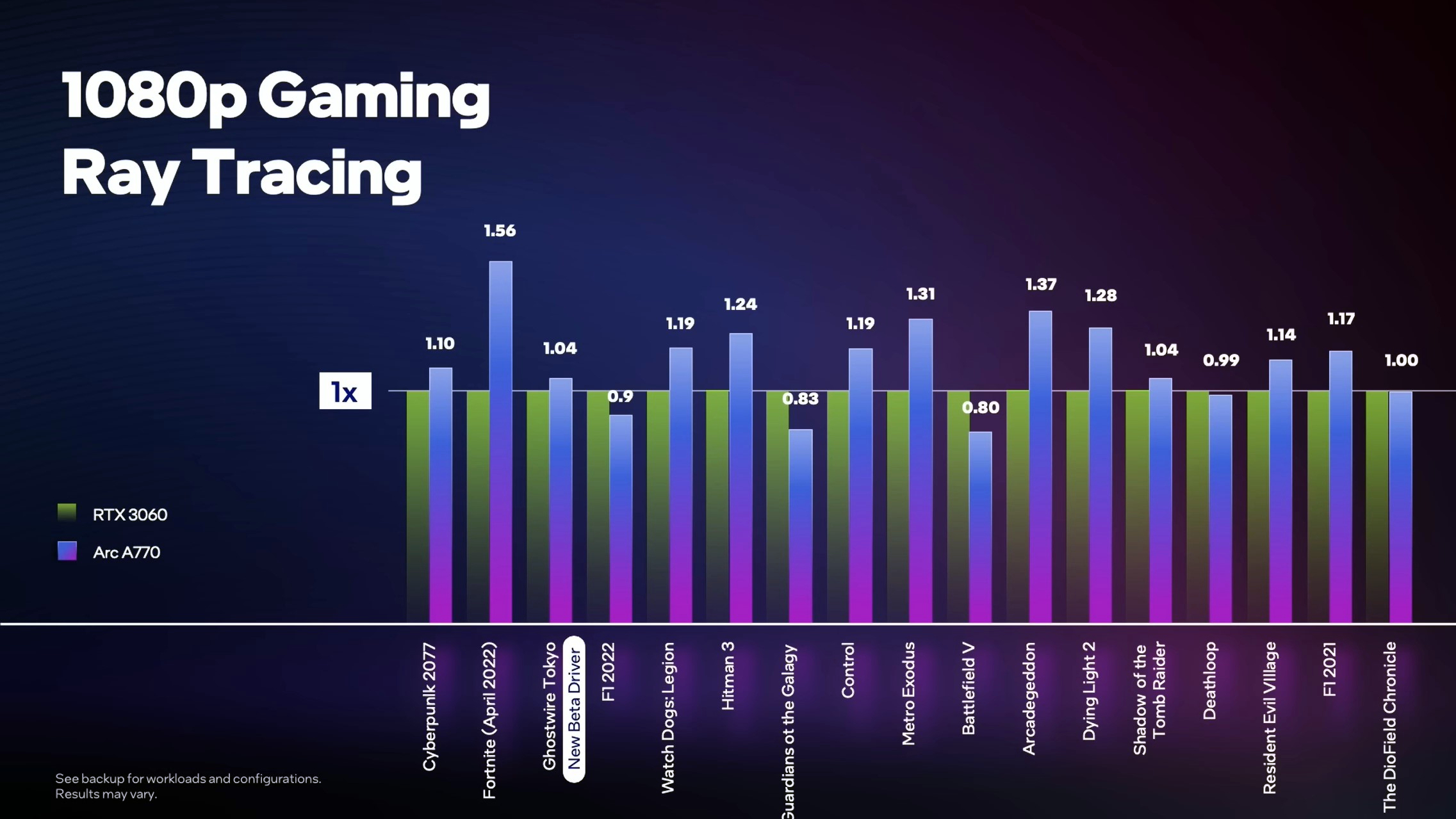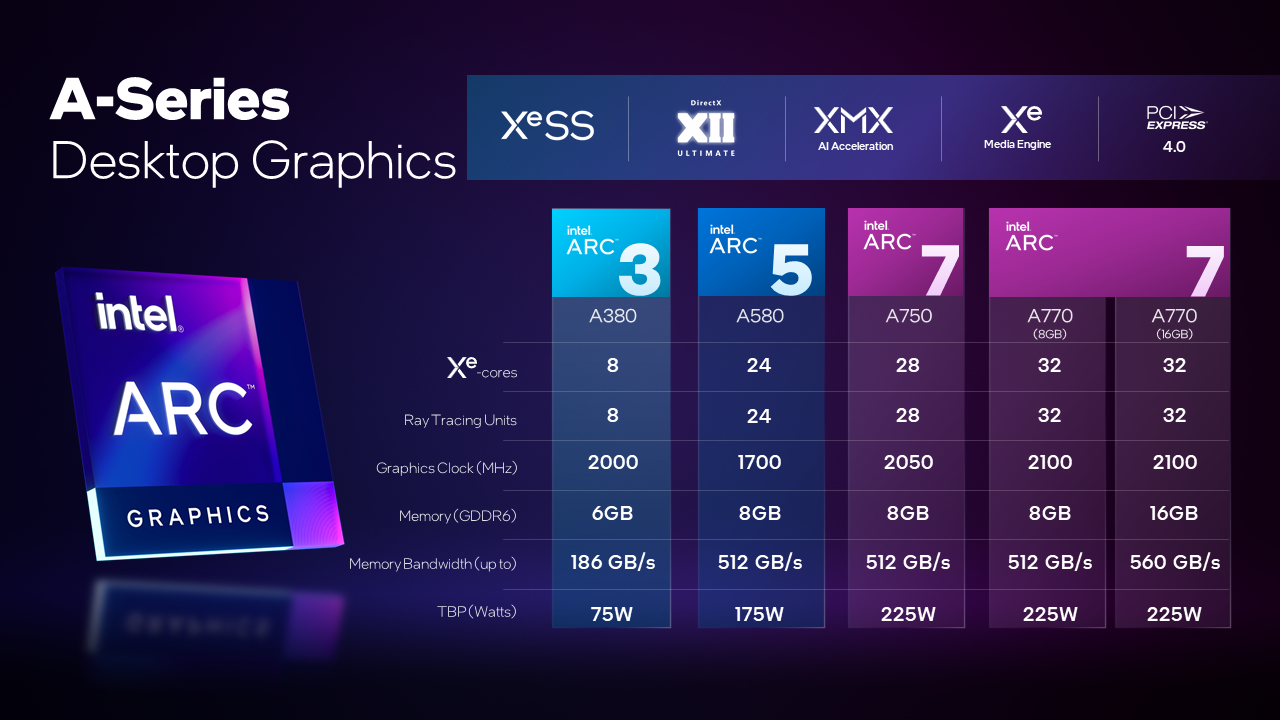Intel Arc A770 GPU release date, price, specs and latest news
Intel says it outperforms Nvidia's RTX 3060 for the same price

Intel unveiled its top-of-the-line Arc A770 graphics card this week during its Intel Innovation developer conference, establishing a new high-water mark for Intel Arc GPUs with the $329 card.
This is a big deal because it's the most powerful Intel Arc GPU we've seen yet. Intel has claimed the Arc A770 runs many games better (at 1080p with ray tracing enabled) than Nvidia's GeForce RTX 3060. This has been confirmed by the first crop of reviews.
Here's everything you need to know about the Intel Arc A770, including the release date, price, specs and more.
Intel Arc A770 GPU release date and price
The Intel Arc A770 GPU has a release date of October 12. The price is $329.
This is the same price as the Nvidia GeForce RTX 3060, a card released at the tail end of 2020 for $329. Not that you were likely to get one at that price, given that until recently GPU prices were skyrocketing thanks to semiconductor shortages and greedy crypto miners.
Now that GPU prices are falling it seems quite possible you'll be able to get your hands on a new Arc A770 for MSRP when they launch in October.
Intel Arc A770 specs
The Intel Arc A770 will ship in at least two variants: Intel's own A770 Limited Edition GPU, and then whatever A770 cards Intel's partners build. This is important because Intel's Limited Edition cards sport 16GB of GDDR6 VRAM, while the variants shipped by partners will come with just 8GB.
Get instant access to breaking news, the hottest reviews, great deals and helpful tips.
It's yet unclear whether we can expect the less capable 8GB A770 cards to be cheaper than the 16GB Intel-branded card, but we sure hope that's the case.
Intel Arc A770 outlook
By pitting this new $329 GPU against the $329 GeForce RTX 3060, Intel is directly challenging Nvidia's popular last-gen cards and promising gamers they'll get better performance for the same price from the Intel A-series vs. GeForce RTX 30-series GPUs. That might seem a bit behind the curve considering that Nvidia's now talking up its new 40-series cards, but I think it's a pretty smart business move.
When the Nvidia GeForce RTX 4080 and 4090 cards were unveiled earlier this month, it was hard not to balk at the prices. Nvidia asking $1,599 for a 4090 is painful enough, but it's the upsell on the RTX 4080 12GB that convinced my colleague Tony Polanco to skip the RTX 40-series entirely.
See, Nvidia is selling two variants of 4080 ($899 for a 4080 12GB, $1,199 for a 4080 16GB) and it appears as though the weaker version isn't just lacking in RAM -- it's a less powerful card that's more akin to what we might expect from a 4070 or 4070 Ti.
Consider that the RTX 3070 and 3070 Ti cost significantly less than $899 when they debuted in 2020 ($499 for the 3070, $599 for the 3070 Ti) and it starts to feel like Nvidia is taking advantage of customers by upselling an underpowered card as a 4080.

Nvidia CEO Jensen Huang justified the high prices of these cards by claiming that Moore's Law is dead, stating "the idea that the chip is going to go down in price is a story of the past" in an interview with Digital Trends and PC World. Intel CEO Pat Gelsinger disagrees, stating in his Intel Innovation keynote that "Moore's Law is alive and well" according to Marketwatch.
So who's right? We'll have to wait and see what kind of wonders these GPU industry titans can work with silicon in the years to come. Intel certainly appears to have capitalized on a weak point in Nvidia's market strategy by queuing up a slate of (comparatively) cheap desktop GPUs just as GeForce 30-series card prices are starting to plummet and their successors are starting to seem wildly overpriced.
Of course, we're still waiting on the next-gen RDNA 3 GPUs we're expecting AMD to unveil before the end of 2022. Last we heard, Big Red could take the wraps off the next big thing in Radeon GPUs as soon as November -- and we'll let you know how they stack up to the competition.

Alex Wawro is a lifelong tech and games enthusiast with more than a decade of experience covering both for outlets like Game Developer, Black Hat, and PC World magazine. A lifelong PC builder, he currently serves as a senior editor at Tom's Guide covering all things computing, from laptops and desktops to keyboards and mice.
 Club Benefits
Club Benefits







